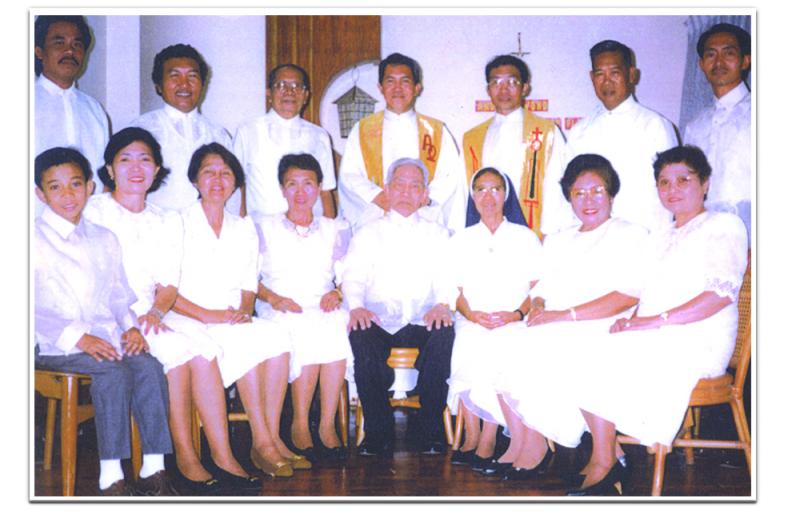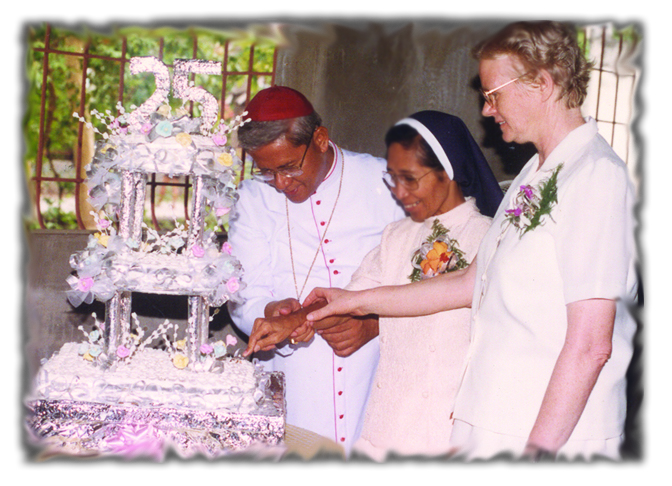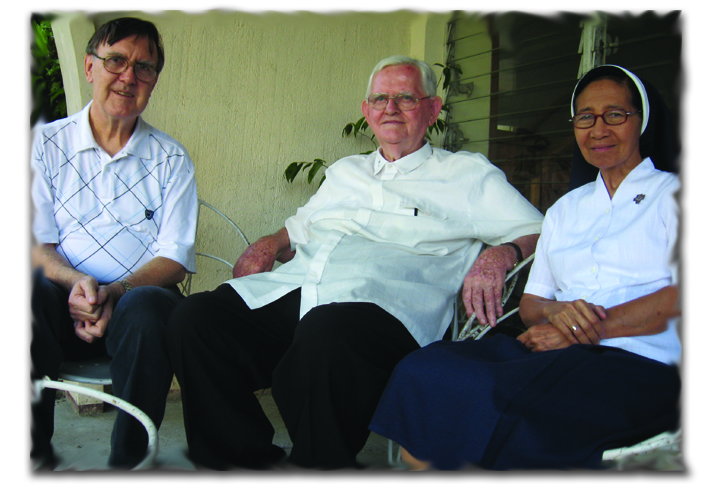'ICHTHYS' As A Way To The Lord
By Father Raymundo T. Sabio MSC
The author is now serving in the Marshall Islands after many years in South Korea where he was a chaplain in these fields: Apostleship of the Sea; the welfare of foreign workers; Incheon International Airport. His brother, Father Generoso, ‘Gene,’ is now based in the USA (San Bernardino, California) after having worked for six years as Third Assistant General of the MSCs in Rome. Father Gene has a website at http://web.tiscali.it/gene.sabio while Father Raymundo, ‘Ray,’ has two:www.geocities.com/haeyangrts/AoS.html and http://m-jpic.tripod.com/raysabio

The author, standing fourth from left, during their family reunion in 1994
The New Testament contains many references to the realities of rural life. Cattle and wolves, goats and sheep, vineyards and cornfields, the lilies of the field and the mustard seed, the sea and the lake, bread and wine, trees and rivers, stone and mud, and so on. But one important thing seemed to be of special interest to Christ: the fish, ‘ICHTHYS’, in Greek. A number of Christ’s miracles had something to do with fish.
Fish tales
Christ selected fishermen as his first apostles; he often went with them on their fishing trips. And at one point, he designated Peter, and likewise all the apostles, to be ‘fishers of men’. No wonder that in the early Church, especially during the period of persecution, the fish, ichthys, became the secret symbol of Christ for the Christian Community.
The life of my third eldest sister, Angelica Taco Sabio, also had something to do with fish. She was born on 23 November 1935 in Sta Clara, Oton, Iloilo, and was six when World War II came to the Philippines. She has a very clear memory of the war.
One thing she remembers very well is the great difficulties associated with a semi-nomadic life because of constant evacuation, compounded by an unavoidably absent father. At times, she had to be placed in a basket, her younger brother, myself, in another, both tied to the shoulder-pole that Ilonggos call a ‘tuwang-tuwang’ and carried by a relative to an evacuation site.
In the early part of the war, my mother and her children experienced gradual rejection by the village people because my father was a sergeant in the USAFFE (US Army Forces Far East). At that time, the Japanese invading forces were gradually becoming very cruel to the families of the soldiers as well as to those who sheltered them.
Sanctuary in the mountains
So, my maternal grandfather, Elias Taco, a fearless and resourceful person, searched for a place higher and deeper in the mountains and finally found a favorable spot in the area called Badbaran. He constructed a small hut where he, my mother and her five little children, my aunts and my cousins could stay; there was a cave nearby where the clan could hide in case of attacks by the Japanese.
Life was very crude and miserable; they had root crops and clover leaves, malunggay, for food. At night, they could hear the terrifying howls of wild animals and the sound of big rattlesnakes. The experience of war made all my older sisters and brother, Maria Fe, Lourdes, Angelica, Ramon and Nenita, more courageous, resourceful and decisive, possessing a good deal of perseverance and determination.
After the war, my father was honorably discharged from the military and in 1950 decided to transfer his family to the neighboring province of Negros Occidental. After a number of short stints in various manual and menial jobs, he finally settled in the town of Binalbagan.
In pursuit of a dream
In March 1956, my sister Angelica graduated from high school. She wanted very much to study nursing in Bacolod City but the financial constraints of the family prevented her from pursuing her dream. Instead, she got employed as a pharmacy clerk at the Horvel Drugstore with a salary of P80 per month.
In 1957, Binalbagan Catholic High School was opened by the Columban Fathers, with Fr Patrick Hurley as Director. So, Angelica’s younger siblings could start their high school studies. Her meager salary significantly helped the family to partly meet the financial obligations involved. Much later, her salary was raised to P100. In the meantime, Father Hurley arranged for the payment of board and lodging for her four younger brothers, Salvador, myself, Generoso and John, in the seminary of the Missionaries of the Sacred Heart in Cebu. Generoso and I were later ordained as MSC priests. My father could never forget this great financial assistance; without it, there was no way for him to shoulder all the expenses.
Then Father Hurley and the Columbans decided to set up Binalbagan Catholic College with a view to begin in 1961. My sister Angelica planned to study commerce there. But she thought it would be very difficult to combine her studies with her full-time work as pharmacy clerk.
Honorable labor

Sr Fidelis celebrating her Silver Jubilee
So one day, she went to the market to see for herself certain possibilities. She saw some vendors selling fish in small quantities by the roadside. There were still vacant spots. So, she approached the pharmacy owner, and explained her plans. He remarked, ‘Aren’t you ashamed to be a fish vendor when you have a decent job here in the pharmacy?’ My sister’s response was, ‘I have nothing to be ashamed of. Labor is honorable.’ The owner consented and told her she could return to the pharmacy if her little fish business failed. And so she went.
She rose very early the next morning, and headed for Aguisan Fish Center, about seven kilometers away, and purchased two medium-size baskets of fish. She rushed to our town market, took her position at the roadside, and sold all the fish by 11:30am. She counted her cash, and was excited to find that the fish had gained her a profit of P5 that very day! So, if that were multiplied by 30, it would mean P150 Pesos per month. Not bad for a beginner.
Later on, the fish business expanded a bit and she financed her schooling with her earnings. Finally, after much hard work and struggle, she finished her BSC course in 1965 and consequently edified her younger sister and brothers with the challenging lesson that ‘sacrifice can lead one on the road to success’.
Answering a higher call

Our Editor with Fr Hurley and Sr Fidelis
With her graduation, a new horizon opened to her. She taught for two years at Our Lady of Snows High School in Himamaylan. Her close association with the Presentation Sisters as well as the Columban Fathers probably reinforced the call of the Lord to the religious life.
And so, after this teaching stint, she left for the novitiate of the Presentation Sisters (PBVM) in New Zealand. When she made her First Profession in April 1970 she became the first Filipino Presentation Sister. She chose ‘Fidelis’ as her religious name, to indicate her fidelity to the call of the Lord. With God’s superabundant grace, she was accepted for Perpetual Profession in April 1975.
Fish was very special to our Lord Jesus Christ. Moreover, it became a powerful symbol of the Lord Himself in the early Church during the persecution. Fish was the source of livelihood for Peter and many apostles before they answered the call of the Lord. Fish, ‘ichthys’, gave Sister Fidelis T. Sabio PBVM a way to the Lord.
You may write Sister Fidelis at: Presentation Sisters, Scala Retreat House, PO Box 95,
6100 BACOLOD CITY
You may email Father Ray at haeyangrts@yahoo.com
